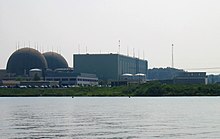 Four years ago a man and a woman knocked on Katharine D. Dewart’s door, offering easy money for the use of her land.
Four years ago a man and a woman knocked on Katharine D. Dewart’s door, offering easy money for the use of her land.
Handing her a brochure that included serene before-and-after pictures, they explained that a natural gas company was seeking to drill somewhere on her 35 acres of wildflower fields surrounded by hemlock woods in this Tompkins County town near Ithaca.

 Energy Glance
Energy Glance Car giant Honda opened the UK's first public hydrogen filling station today in a move aimed at boosting the development of hydrogen-powered vehicles.
Car giant Honda opened the UK's first public hydrogen filling station today in a move aimed at boosting the development of hydrogen-powered vehicles. A furnace at a nuclear-waste incinerator in southern France exploded Monday, killing one person and injuring four others.
A furnace at a nuclear-waste incinerator in southern France exploded Monday, killing one person and injuring four others. The Canadian Association of Petroleum Producers released a set of principles to govern the controversial practice of hydraulic fracturing used to release vast reserves of natural gas.
The Canadian Association of Petroleum Producers released a set of principles to govern the controversial practice of hydraulic fracturing used to release vast reserves of natural gas. The 5.8-magnitude earthquake last month in Virginia caused about twice as much ground shaking as a nearby nuclear power plant was designed to withstand, according to a preliminary federal analysis.
The 5.8-magnitude earthquake last month in Virginia caused about twice as much ground shaking as a nearby nuclear power plant was designed to withstand, according to a preliminary federal analysis.  The risk that an earthquake would cause a severe accident at a U.S. nuclear plant is greater than previously thought, 24 times as high in one case, according to an Associated Press analysis of preliminary government data. The nation's nuclear regulator believes a quarter of America's reactors may need modifications to make them safer.
The risk that an earthquake would cause a severe accident at a U.S. nuclear plant is greater than previously thought, 24 times as high in one case, according to an Associated Press analysis of preliminary government data. The nation's nuclear regulator believes a quarter of America's reactors may need modifications to make them safer.






























